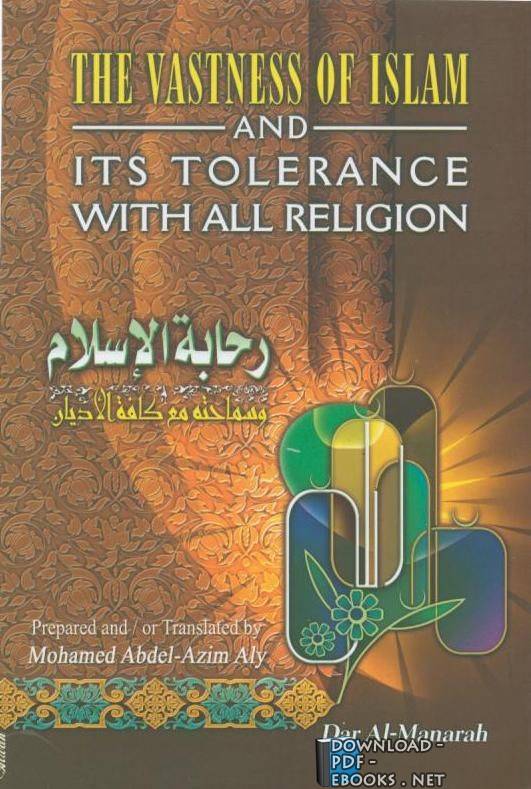📘 ❞ The Vastness of Islam and its Tolerance with all Religion ❝ كتاب ــ mohamed abdel azim aly محمد عبد العظيم علي اصدار 2004
كتب اسلامية باللغة الانجليزية - 📖 كتاب ❞ The Vastness of Islam and its Tolerance with all Religion ❝ ــ mohamed abdel azim aly محمد عبد العظيم علي 📖
█ _ mohamed abdel azim aly محمد عبد العظيم علي 2004 حصريا كتاب ❞ The Vastness of Islam and its Tolerance with all Religion ❝ عن دار المنار 2025 Religion: من Islamic Books اسم الكتاب: the vastness islam tolerance religion رحابة الإسلام وسماحته مع كافة الأديان الكاتب: علي Religious in IslamReligious Islam One most important aspects Human Rights issue is respect which society must show towards religions other people; this, course, includes freedom religion Tonight I would like to talk very briefly about point view on religious The Qur'anic Point View Islam, Judaism Christianity, believes prophets messengers God One interesting way understanding look at role Had they been sent forcefully bring people into their teachings? Were Moses, Jesus Muhammad ordered by Almighty impose teachings upon sword? Absolutely not! Look Qur'an, holy scripture Islam; revealed words where He clearly outlines duty his messengers saying: “(And as for My messenger,) there no (obligation) him except deliver (the message) knows what yon expose conceal” (5:99) Once Mecca said Prophet that if god did not want them worship idols then why does prevent from doing so Then following message: “(O Muhammad) This a new excuse; those who weft before, made, same excuses Is anything dear conveying message” (16: 35) So we see view, mission was but guide ask accept own will, one revelation, says Muhammad: "But turn away (then do be sad because) We ma you guardian over It only message " (42:43) Qur’an cannot forced anyone says, "There compulsion (accepting) (of Islam)…” Why? Because: "truly right has become distinct error (2:256) Prophet’s Example The faced much difficulty opposition birth place, city eventually migrate Medina But spite opposition even physical torture followers suffered Mecca, always approached unbelievers At stage mission, read short chapter revelation: “O believe! worship, are worshipping worship; nor am 1 worship; neither art Therefore, your religion; me my religion!” (chap 109) When migrated Medina, he found besides hid accepted Islam, large Jewish community that, this bother contemplate forcing Fold instead, made peace agreement called ahlul kitab—the Scripture indeed supreme example shown between Jews dearly guaranteed physical safety security community also practise freely long 35 abided terms treaty historically, prepared live monotheistic religions, especially Christianity Even letters wrote rulers various countries nations around Arabia interesting documents our discussion In none threaten military aggression message letter Christian King Abyssinia ends words: "I have conveyed now it up Once again, follows true guidance " We an historical document us fourth Imam, ‘Ali Zaynul Abidin (a s,) entitled Risalatu 'l huquq means “The Charter Rights” In Risalah, Imam mentioned rights related various issues human society, last part non Muslims Muslim Among things, says: “And barrier keeping any injustice them, depriving protection provided God, flaunting commitments His Messenger concerning Because told Holy said, "Whosoever protected Muslim, will enemy (on Day Judgement)," 'Ali governor Egypt, says, "Sensitive heart mercy subjects, affection kindness Do stand greedy beasts feel enough devour two kinds; either brother faith or Creation {Nahju Balagha, 53) كتب اسلامية باللغة الانجليزية مجاناً PDF اونلاين books texts believe were authored via throughout humanity's history All these books, belief, promulgated code laws ordained

كتاب
The Vastness of Islam and its Tolerance with all Religion
ــ mohamed abdel azim aly محمد عبد العظيم علي
صدر 2004م عن دار المنار
كتاب
The Vastness of Islam and its Tolerance with all Religion
ــ mohamed abdel azim aly محمد عبد العظيم علي
صدر 2004م عن دار المنار- مساهمة من: Mohamed Abdel Azim Aly
( الأحد 11 مايو 2008 ( 1:05 مساءً )) - تبليغ عن سوء استخدام


The Vastness of Islam and its Tolerance with all Religion من Islamic Books
اسم الكتاب: the vastness of islam and its tolerance with all religion رحابة الإسلام وسماحته مع كافة الأديان
اسم الكاتب: mohamed abdel azim aly محمد عبد العظيم علي
Religious Tolerance in IslamReligious Tolerance in Islam
One of the most important aspects of the Human Rights issue is the respect and tolerance which society must show towards the religions of other people; this, of course, includes the issue of freedom of religion. Tonight I would like to talk very briefly about the Islamic point of view on religious tolerance.
The Qur'anic Point of View
Islam, like Judaism and Christianity, believes in prophets and messengers of God- One interesting way of understanding the Islamic view on freedom of religion is to look at the role of the prophets and messengers.
Had they been sent to forcefully bring the people into their teachings? Were Moses, Jesus and Muhammad ordered by the Almighty to impose their teachings upon the people by sword? Absolutely not! Look at the Qur'an, the holy scripture of Islam; the revealed words of God where He clearly outlines the duty of his messengers by saying:
“(And as for My messenger,) there is no (obligation) on him except to deliver (the. message). God knows what yon expose and what conceal”. (5:99).
Once the people of Mecca said to Prophet Muhammad that if god did not want them to worship idols then why He does not forcefully prevent them from doing so. Then God sent the following message:
“(O Muhammad) This is not a new excuse; those who weft before, them made, the same excuses. Is there anything upon the messengers except the dear conveying of the message”. (16: 35).
So we see that from the Qur'anic point of view, the mission of the prophets and messengers of God was not to forcefully impose their teachings on the people but to guide them and ask them to accept God with their own will, in one revelation, God says to Prophet Muhammad:
"But if the people turn away (then do not be sad because) We did ma sent you to be a guardian over them. It is for you only to deliver the message." (42:43).
The Qur’an clearly says that religion cannot be forced on anyone. It says,
"There is no compulsion in (accepting) the religion (of Islam)…”
Why? Because:
"truly the right way has become clearly distinct from error. " (2:256).
The Prophet’s Example
The Prophet of Islam faced much difficulty and opposition in his own birth- place, the city of Mecca. He was eventually forced to migrate to Medina. But in spite of all the opposition and even physical torture that his followers suffered in Mecca, Prophet Muhammad always approached the unbelievers of Mecca with tolerance. At one stage of his mission, the Prophet read to them a short chapter from the revelation:
“O you who do not believe! I worship not what you worship, and you are not worshipping what I worship; nor am 1 worshipping what you worship; neither -art you worshipping what I worship. Therefore, to you your religion; and to me my religion!” (chap. 109)
When Prophet Muhammad migrated to Medina, he found that besides those who hid accepted Islam, there was a large Jewish community in that, city but this did not bother him He did not contemplate on forcing them into the Fold of Islam, instead, he made a peace agreement with them and called them ahlul kitab—the people of the Scripture. This was indeed the supreme example of tolerance shown towards the followers of other religions.
The peace agreement between the Prophet and the Jews of Medina dearly guaranteed the physical safety and security of the Jewish community and also the freedom to practise their religion freely as long 35 that community also abided the terms of the treaty.
So we see that even historically, the Prophet of Islam was prepared to live in peace with the followers of other monotheistic religions, especially Judaism and Christianity.
Even the letters that the Prophet wrote to the rulers of various countries and nations around Arabia are interesting documents for our discussion. In none of the letters does the Prophet threaten them of a military aggression if they did not accept the message of Islam. The letter to the Christian King of Abyssinia ends with the words: "I have conveyed the message and now it is up to you to accept it. Once again, peace be upon him who follows the true guidance."
We have an interesting historical document with us from our fourth Imam, ‘Ali Zaynul Abidin (a.s,). This document is entitled as Risalatu 'l huquq which means “The Charter of Rights”.
In this Risalah, the Imam has mentioned rights related to various issues and people in human society, the last part is on the rights of non-Muslims in a Muslim society. Among other things, it says: “And there must be a barrier keeping you from doing any injustice to them, from depriving them of the protection provided by God, and from flaunting the commitments of God and His Messenger concerning them.
Because we have been told that the Holy Prophet said, "Whosoever does injustice to a protected non- Muslim, then I will be his enemy (on the Day of Judgement)," In a letter which Imam 'Ali wrote for his governor in Egypt, he says, "Sensitive your heart to mercy for the subjects, and to affection and kindness for them. Do not stand over them like greedy beasts who feel it is enough to devour them, for they are of two kinds; either your brother in faith or like you in Creation." {Nahju 'l-Balagha, letter 53).
#1K
0 مشاهدة هذا اليوم#24K
1 مشاهدة هذا الشهر#36K
7K إجمالي المشاهدات- 🎁 كن أول كاتب اقتباس في هذه الصفحة واحصل على هديّة 15 من النقاط فوراً 🎁
